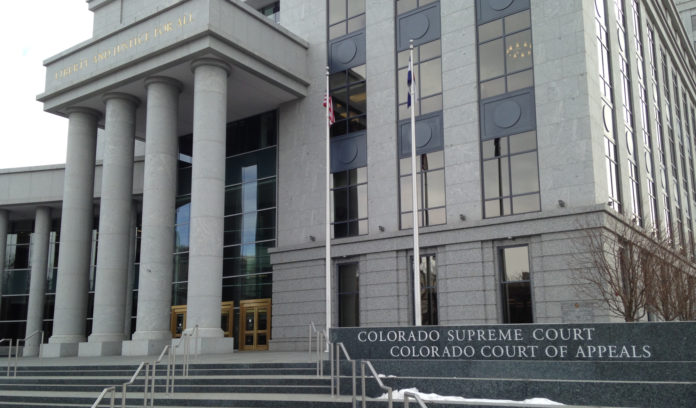

Brooke Rojas stood trial for theft of food stamps she allegedly obtained by deception between February and July 2013. Should the jury have been shown a food assistance application from August of that year?
The question is one the justices of the Colorado Supreme Court considered on Sept. 14 during their first day of in-person oral arguments in more than a year. But at the heart of the case is a bigger question: Should Colorado abandon the res gestae doctrine? The common-law doctrine, whose name means “things done” in Latin, allows for the admission of evidence that is incidental to the charged offense but closely connected and helps explain or provide context for the events in question.
In Rojas’ case, prosecutors say her August 2013 food stamps application, though it wasn’t used to commit the crime she was charged with, made it more likely she knowingly deceived the Department of Human Services on an earlier application because she misstated her income on both forms. The trial court admitted the August benefits application as res gestae “because it provided circumstantial evidence of Rojas’s mental state and because it was a continuing part of the charged act,” according to the state’s answer brief to the Supreme Court.
Although Colorado courts have long allowed evidence as res gestae, Rojas argues the state should abandon the doctrine. “The question before this court is whether the res gestae doctrine is still a valid rule of evidence in this state,” said Rojas’ attorney, Rachel Mercer of the state public defender’s office, during oral arguments. “And this court should find that it’s not because it’s too vague and Colorado courts have been trying to consistently apply this doctrine without success for decades.”
“This court also needs to abolish the res gestae doctrine because it violates the fundamental principle that a defendant is only supposed to be tried for the charged offense and not for any other alleged misconduct,” Mercer added.
Instead of res gestae, courts should apply Colorado Rule of Evidence 404(b) to determine whether evidence of other crimes, wrongs or acts is admissible, Mercer said. Rule 404(b) comes with certain protections, such as barring evidence of other acts as character or propensity evidence and requiring prosecutors to provide notice to the defendant. The res gestae doctrine is “used to get around the protections required by that rule,” Mercer said, which results in injustice to defendants who are forced to defend against allegations of uncharged misconduct.
Chief Justice Brian Boatright asked Mercer if eliminating res gestae would really clarify questions about whether evidence is relevant to the charged crime. “Are we not just trading confusion?” he said. “I know we’ve got a good Latin phrase for this, but are we not just changing the focus to [Colorado Rules of Evidence] 401 [and] 403?” CRE 401 defines relevant evidence and CRE 403 is used to weigh the probative value of evidence against the risk of unfair prejudice.
Mercer responded that eliminating the doctrine would make the law simpler, and if the court’s concern is that the law is too confusing, “I think it’s clear that the res gestae doctrine is not the solution.” Part of the problem with the doctrine, Mercer said, is that it has multiple definitions, and its definitions are “so vague and broad” that they could encompass all relevant evidence. The “confusing Latin phrase” only serves to obscure the analysis of evidentiary rulings and confuse the lower courts, Mercer added.
Assistant Attorney General Kevin McReynolds contended that Rojas’ case is “not a proper vehicle” for considering the viability of the res gestae doctrine because the trial court did not err by admitting evidence that “had a verifiable and significant connection to the factual circumstances of the theft.”
Justices Carlos Samour and Richard Gabriel pushed back. “The prosecutor asked for a ruling on res gestae. The prosecution got the ruling on res gestae. That’s how it came in,” Gabriel said, adding that the prosecution “vehemently objected” to Rojas’ request that the August application be accompanied by a limiting instruction for the jury, “which it would have had if 404(b) was at issue.”
McReynolds responded that res gestae provides a toolbox for distinguishing between evidence of other acts and evidence intrinsic to the charged crime, and the state’s position is that Rojas’ August application is the latter. “It is directly relevant evidence that was directly relevant to her intent,” he said. “It is verifiably and significantly connected to her actions.” As such, he said, the August document would have been admitted as relevant evidence under CRE 401 and assessed under CRE 403.
“Give me the parade of horribles,” said Justice William Hood. “If we abolish the res gestae doctrine and say the rules of evidence govern, tell me what the world looks like and how dogs are going to be sleeping with cats and it’s going to be awful.”
“You’re just trading problems. You’re not getting anything better while making bigger burdens on trial courts and litigants,” McReynolds responded.
“I don’t think that this rule is so crazy that it should be abolished, especially given its national acceptance,” he added. “It’s not going to make things considerably better, which I think would be the other factor to consider, especially because our rule is now word-for-word identical to the federal court’s.”
In his answer brief, McReynolds noted that the Colorado Supreme Court recently amended 404(b) to track the language and structure of Federal Rule of Evidence 404(b), which the 10th Circuit and most federal jurisdictions say doesn’t apply to “inextricably intertwined” evidence that is considered res gestae in Colorado. Abolishing the res gestae doctrine will put Colorado at odds with the federal courts, he noted, and the court should avoid a decision where the choice of forum alone would lead to different outcomes.

